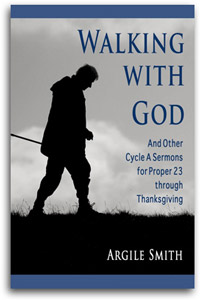SermonStudio
Powerless People
Sermon
Walking With God
Cycle A First Lesson Sermons for Proper 23 through Thanksgiving
Some time ago, someone in Fred's congregation asked him to read a book by a fellow named Tex Sample. As pastor of the church, Fred always appreciated the opportunity to read books recommended by his congregants. His long years of ministry had taught him that in almost every book he could find at least one good idea. Sometimes the idea would find its way into one of his sermons. At other times, the idea would be tucked away for further examination, or it would be presented over coffee to engage the people gathered around the table in a hearty conversation or debate.


